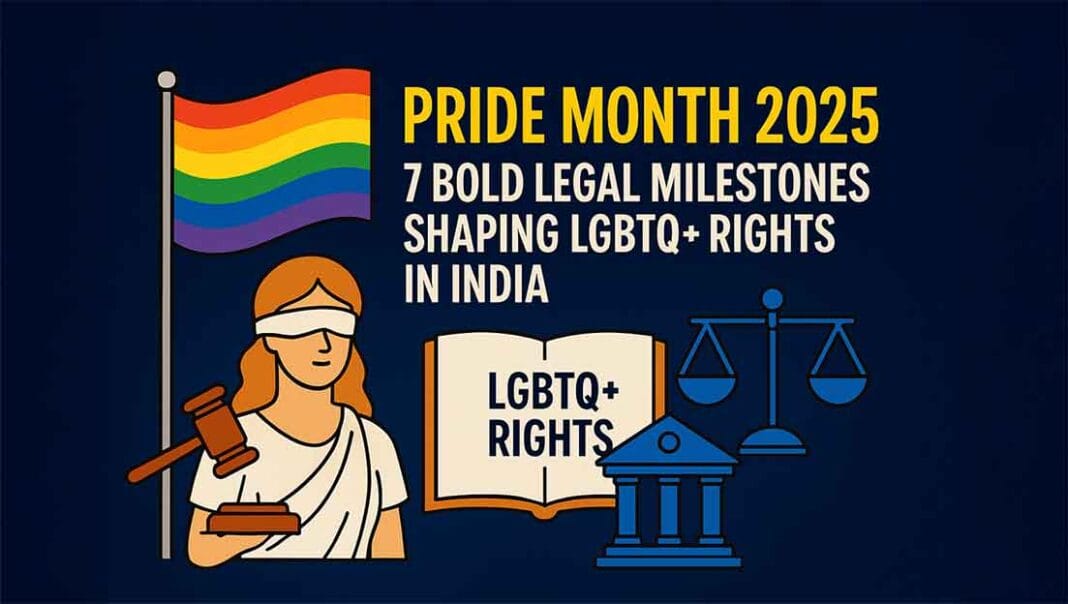Pride Month 2025: 7 Bold Legal Milestones Shaping LGBTQ+ Rights in India
Every year, Pride Month offers an opportunity to reflect on the progress made and the challenges that remain in the fight for LGBTQ+ rights. In India, the journey has been marked by significant legal victories and ongoing struggles. Let’s delve into seven key milestones that have shaped the landscape of LGBTQ+ rights in India.
1. Decriminalization of Section 377: A Historic Verdict
In September 2018, the Supreme Court of India delivered a landmark judgment in the case of Navtej Singh Johar v. Union of India, decriminalizing consensual same-sex relations by reading down Section 377 of the Indian Penal Code. This unanimous decision affirmed that criminalizing consensual sexual acts between adults violated fundamental rights under Articles 14, 15, 19, and 21 of the Constitution.
“History owes an apology to the members of this community and their families.” – Justice Indu Malhotra
This verdict marked a significant step toward equality and set the stage for further legal reforms.
Further Reading: Navtej Singh Johar v. Union of India – Wikipedia
2. Supreme Court’s Stance on Same-Sex Marriage
In October 2023, the Supreme Court of India declined to legalize same-sex marriages, stating that such decisions fall within the purview of the legislature. While the court acknowledged the rights of queer individuals to cohabit and form relationships, it emphasized that the recognition of marriage equality is a matter for Parliament to decide.
This ruling was met with disappointment by many in the LGBTQ+ community, who continue to advocate for equal marital rights.
Further Reading: India’s Supreme Court Rules Against Marriage Equality – NPR
3. Transgender Persons (Protection of Rights) Act, 2019
The Transgender Persons (Protection of Rights) Act, enacted in December 2019, aims to protect the rights of transgender individuals and promote their welfare. The Act prohibits discrimination in education, employment, healthcare, and access to public services. However, it has faced criticism for requiring transgender individuals to undergo medical procedures to be legally recognized, which many argue infringes upon the right to self-identify.
Further Reading: Transgender Persons (Protection of Rights) Act, 2019 – Wikipedia
4. Ban on Conversion Therapy: A Landmark Judgment
In June 2021, the Madras High Court, in the case of S. Sushma v. Commissioner of Police, issued a landmark ruling banning conversion therapy practices aimed at changing an individual’s sexual orientation or gender identity. The court directed the National Medical Commission to take disciplinary action against professionals engaging in such practices and called for comprehensive measures to sensitize society and various branches of the government.
Further Reading: S. Sushma v. Commissioner of Police – Wikipedia
5. Recognition of Chosen Families
In June 2025, the Madras High Court affirmed that LGBTQIA+ individuals have the right to form families beyond traditional marital frameworks. The court recognized the legitimacy of “chosen families,” emphasizing that marriage is not the sole pathway to building a family. This ruling underscores evolving legal perspectives on family structures and supports the rights of LGBTQIA+ individuals to establish familial bonds beyond traditional norms.
Further Reading: LGBTQIA+ Couples Have Right to Find a Family: Madras High Court – Times of India
6. Tamil Nadu’s Progressive LGBTQ+ Policy
In February 2025, the Tamil Nadu government proposed a comprehensive policy aimed at improving the lives of LGBTQ+ and intersex individuals. The policy includes measures such as:
Reservation in public employment and education
Protection for intersex individuals from forced surgeries
Mental health support services
Gender-neutral restrooms in public buildings
While implementation is ongoing, this policy sets a precedent for other states to follow.
Further Reading: Indian State Proposes Sweeping LGBTQ Policy – Washington Blade
7. Political Representation: A Step Toward Inclusivity
In 2024, the All India Professional Congress (AIPC) established an LGBTQIA+ vertical, appointing activist Mario da Penha as its chief. This move signifies a growing recognition of LGBTQ+ issues within mainstream political discourse and highlights the importance of representation in policymaking processes.
Further Reading: Congress’s AIPC Sets Up LGBTQIA+ Vertical, Appoints Mario da Penha as Its Chief – Hindustan Times
Conclusion: The Road Ahead
Pride Month 2025 serves as a reminder of the progress achieved and the work that remains in the pursuit of equality for LGBTQ+ individuals in India. Legal milestones have paved the way for greater acceptance, but societal attitudes and legislative reforms must continue to evolve.
Call to Action:
Educate yourself and others about LGBTQ+ issues
Support organizations working toward equality
Advocate for inclusive policies and legislation
Celebrate diversity and promote acceptance in your community
Together, we can build a more inclusive and equitable society for all.
Also Read: Live-in Relationships in India: Legal Rights You Must Know (2025 Update)


